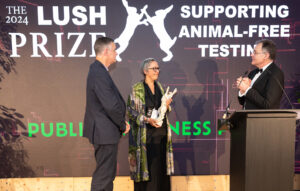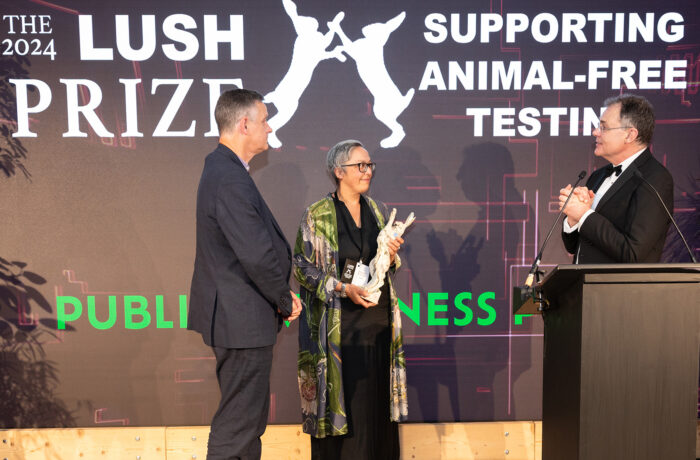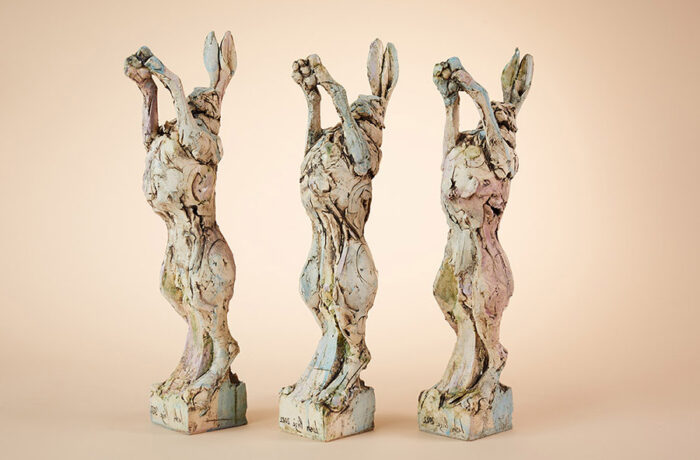Campaigning to end lethal dose testing on animals

Jessamy Korotoga, Head of Science for Animal Aid, discusses the organisation’s campaign to ban lethal dose testing on animals that led to them winning a Lush Prize
Animal Aid was founded almost half a century ago, in 1977. Founded by one lady, Jean Pink, at her kitchen table, it is incredible to think how far we have come! We were founded 50 years after the notorious LD50 test was devised in 1927. The LD50 – or lethal dose 50% test – aims to determine what dose of a substance will be lethal to half of a group of animals. This is typically done through ‘force-feeding’ the animals the substance, but a similar test, the LC50, forces the animals to inhale the substance.
When you look at science and technology today – mobile phones can make international calls, shoot movie-quality video and store thousands of photos; cars are electric and can reach phenomenal speeds; space flight is no longer newsworthy – it is clear how far we’ve come as humans. You’d think that a test devised at a time when not all women in the UK had a right to vote would now be seen as the archaic relic it is, but unfortunately, despite the scientific (and ethical) opposition to these tests, they are still being conducted in Great Britain and globally. In 2024, in Great Britain, 11,922 LC50 and LD50 tests were conducted. The majority of the victims were mice, but rats and fish were also harmed. The suffering these animals will have endured is horrific.
When we realised that the LD50 was fast approaching its 100 year anniversary, we knew we had to re-launch our previous campaign. Not only to try to ban these tests before their hundredth ‘anniversary’ but also to raise awareness of other lethal dose animal tests – how can death be the aim of anything called ‘science’?
Humans, dogs, mice, chickens and cows are all very different – we don’t look the same or react the same way to chemicals, medicines and many other substances. We are largely hairless and bipedal – most other animals are covered in fur, feathers or scales. Those walking on two legs often have wings! These, and other, differences illustrate why animals should not be used in experiments to try to cure or ensure the safety of humans.
Science has progressed in leaps and bounds in 98 years. One example of humane and cutting-edge technology, representing the very best science is ‘AcutoX’. This is a replacement for the oral LD50 and it was developed in the UK by a former winner of the Lush Prize for Training, XCellR8. They are a fully animal-free lab (they do not use animal tissues or cells). Instead of exposing live animals to substances, AcutoX uses donated human skin cells. These are exposed to the substance being tested and their ‘health’ is monitored – the more they are harmed by the substance, the more toxic it is!
In 2024, Animal Aid won the Lush Prize for Public Awareness for our campaign to ban the LD50 test. As well as part-funding the development of AcutoX, we also presented a petition to the relevant government Minister about the LD50 test and produced an animated film to inform people about the test. We held a Parliamentary reception to enable MPs to ask about the LD50 and for experts to provide the answers. We also gave lectures to universities and helped MPs to raise the issue of these tests in various ways.
Since winning the Lush Prize, we have launched our ‘roadmap’, which outlines how it is possible to attain a ‘phase out of animal testing’, and this has been widely distributed. We’ve also held a ‘roundtable’ in Westminster, which enabled us to speak to MPs we might not usually engage with. We brought a range of experts together to discuss the LD50 and other tests, to answer questions and also highlight the technical and economic benefits of replacing ‘animal tests’. We have built new relationships with parliamentarians and their staff, received global recognition and have raised awareness of this test with the public, MPs, journalists and government Ministers.
We sincerely hope the LD50 isn’t causing horrific animal suffering in 2027 and we will do all we can to ensure it is consigned to history. Today, we are looking at a much brighter future, in this regard; in huge part this is thanks to the Lush Prize.








Spread the word: